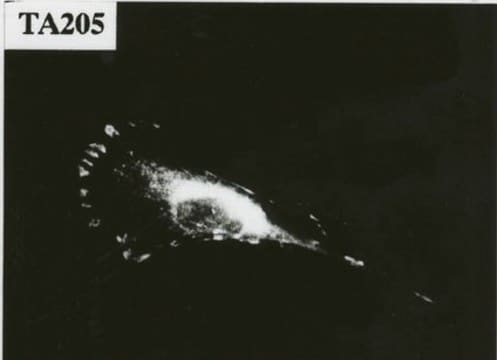B3310
e coli protein expression
for protein expression and DNA plasmid production
Synonym(e):
BL21 Competent Cells, BL21 (DE3)pLysS-T1R Competent Cells
Anmeldenzur Ansicht organisationsspezifischer und vertraglich vereinbarter Preise
Alle Fotos(3)
About This Item
MDL-Nummer:
UNSPSC-Code:
12352200
Empfohlene Produkte
Qualität
for molecular biology
Form
suspension
Versandbedingung
dry ice
Lagertemp.
−70°C
Allgemeine Beschreibung
BL21(DE3)pLysS-T1R are competent E. coli that are suitable for high level induction and expression genes regulated by expression vectors with T7 promoter. The cells have transformation efficiency of ≥5x106 cfu/μg when transformed with non-saturating amounts of pUC19 plasmid DNA.
Sigma′s BL21-T1R competent E. coli cells are grown and made chemically competent using an optimized procedure specific to the strain, followed by strain verification and efficiency testing. The cells are provided in frozen 50 μl aliquots for convenience. Each aliquot can be used for a single transformation.
Anwendung
Suitable for induction and expression of genes directed by the expression systems with T7 promoter
Leistungsmerkmale und Vorteile
- Ensures induction and expression of genes from any T7-promoter based expression system
- Contains the genotype tonA that protects the clonal stocks from lytic bacteriophages
- Contains T7 RNA polymerase that is inducible by addition of IPTG to the culture
- Renders resistance to chloramphenicol; useful for selection process
- Allows compatibility with plasmids containing ColE1 or pMB1 origin
- Guaranteed high transformation efficiency
- Convenient 50 μL aliquots
Komponenten
- BL21(DE3)pLysS-T1R chemically competent cells, 10 X 50 μL (B3185)
- pUC 19 control DNA (10 ng/μL), 10 μL (D2567)
Prinzip
BL21(DE3)pLysS-T1R does not express ion proteases and outer membrane protease, ompT. This prevents the degradation of heterologous proteins expressed by T7 expression vector systems. This strain also contains tonA genotype that confers resistance to lytic bacteriophages such as T1 and T5. The strain is lysogenic for lambda prophage and contains an inducible T7 RNA polymerase regulated by lacUV5 promoter. T7 lysozyme produced by the pLysS plasmid inhibits T7 polymerase that improves transcriptional control.
Ähnliches Produkt
Produkt-Nr.
Beschreibung
Preisangaben
Lagerklassenschlüssel
10 - Combustible liquids
Flammpunkt (°F)
Not applicable
Flammpunkt (°C)
Not applicable
Analysenzertifikate (COA)
Suchen Sie nach Analysenzertifikate (COA), indem Sie die Lot-/Chargennummer des Produkts eingeben. Lot- und Chargennummern sind auf dem Produktetikett hinter den Wörtern ‘Lot’ oder ‘Batch’ (Lot oder Charge) zu finden.
Besitzen Sie dieses Produkt bereits?
In der Dokumentenbibliothek finden Sie die Dokumentation zu den Produkten, die Sie kürzlich erworben haben.
F W Studier et al.
Journal of molecular biology, 189(1), 113-130 (1986-05-05)
A gene expression system based on bacteriophage T7 RNA polymerase has been developed. T7 RNA polymerase is highly selective for its own promoters, which do not occur naturally in Escherichia coli. A relatively small amount of T7 RNA polymerase provided
T A Phillips et al.
Journal of bacteriology, 159(1), 283-287 (1984-07-01)
The product of the pleiotropic gene lon is a protein with protease activity and has been tentatively identified as protein H94.0 on the reference two-dimensional gel of Escherichia coli proteins. Purified Lon protease migrated with the prominent cellular protein H94.0
Host specificity of DNA produced by Escherichia coli: bacterial mutations affecting the restriction and modification of DNA.
W B Wood
Journal of molecular biology, 16(1), 118-133 (1966-03-01)
Unser Team von Wissenschaftlern verfügt über Erfahrung in allen Forschungsbereichen einschließlich Life Science, Materialwissenschaften, chemischer Synthese, Chromatographie, Analytik und vielen mehr..
Setzen Sie sich mit dem technischen Dienst in Verbindung.








